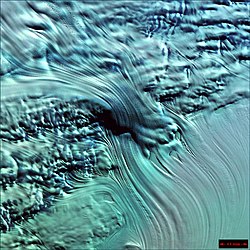
Lambert Glacier is a major glacier in East Antarctica. At about 80 km (50 mi) wide, over 400 km (250 mi) long, and about 2,500 m (8,200 ft) deep, it is the world's largest glacier. It drains 8% of the Antarctic ice sheet to the east and south of the Prince Charles Mountains and flows northward to the Amery Ice Shelf.[1] It flows in part of Lambert Graben and exits the continent at Prydz Bay.
This glacier was delineated and named in 1952 by American geographer John H. Roscoe who made a detailed study of this area from aerial photographs taken by Operation Highjump, 1946–47. He gave the name "Baker Three Glacier", using the code name of the Navy photographic aircraft and crew that made three flights in this coastal area in March 1947 resulting in geographic discoveries. The glacier was described in Gazetteer No. 14, Geographic Names of Antarctica (U.S. Board on Geographic Names, 1956), but the feature did not immediately appear on published maps. As a result the name Lambert Glacier, as applied by the Antarctic Names Committee of Australia (ANCA) in 1957 following mapping of the area by Australian National Antarctic Research Expeditions (ANARE) in 1956, has become established for this feature. It was named for Bruce P. Lambert, Director of National Mapping in the Australian Department of National Development.[2]